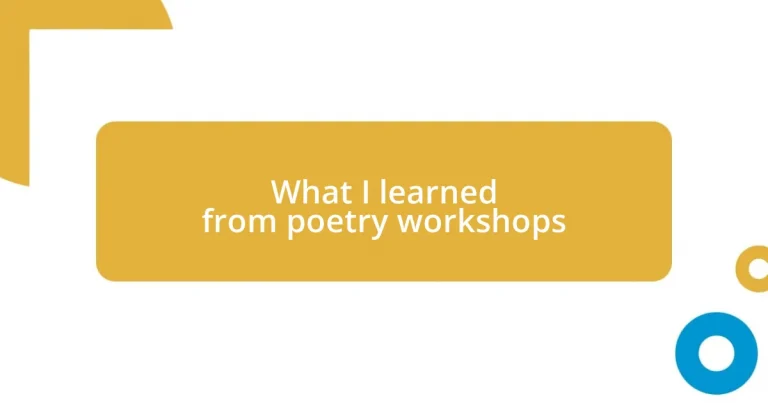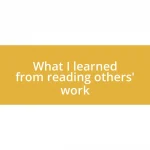Key takeaways:
- Poetry workshops foster a communal atmosphere that enhances creativity through shared experiences and diverse perspectives.
- Constructive feedback is crucial for growth, helping writers refine their techniques and develop unique voices.
- Collaborative writing experiences inspire creativity and strengthen connections among participants, showcasing the power of collective storytelling.
- Vulnerability in sharing personal stories fosters deeper emotional connections with audiences and enhances the impact of poetry.
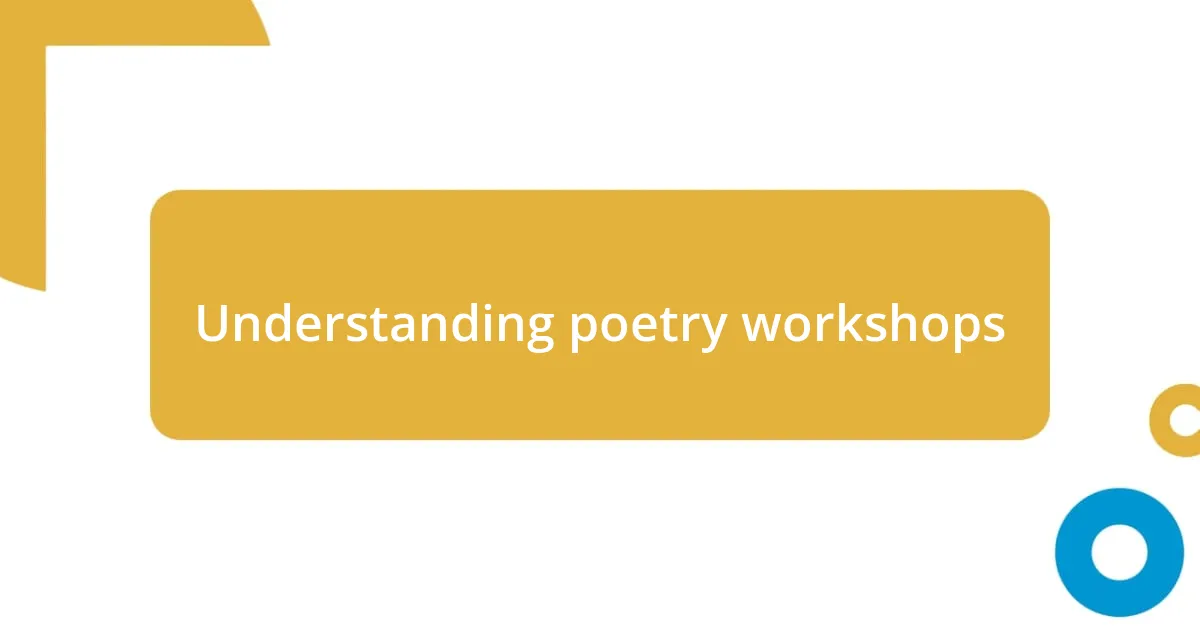
Understanding poetry workshops
Poetry workshops are incredible spaces for exploration and expression, where participants can dive into the nuances of language and emotion. I remember the first workshop I attended; it felt like stepping into a vibrant world where words danced off the page. Have you ever felt that electric excitement when a line of poetry resonates deeply within you?
These workshops often bring together diverse voices, creating a melting pot of ideas and perspectives. I once shared a poem about loss, and the feedback was a heartfelt tapestry that connected experiences I’d thought were uniquely mine. This communal aspect of creativity made me realize how vital it is to hear others’ stories—each line inspired by personal struggle or triumph adds layers to the collective understanding of poetry.
In my experience, the structure of these workshops can vary widely, from open mic sessions to focused critiques. I love the moments of vulnerability when sharing feels like baring one’s soul. It raises a question for us all: can vulnerability be a catalyst for growth? I believe it can, as it encourages us to embrace our authentic selves and connect with others in profound ways.
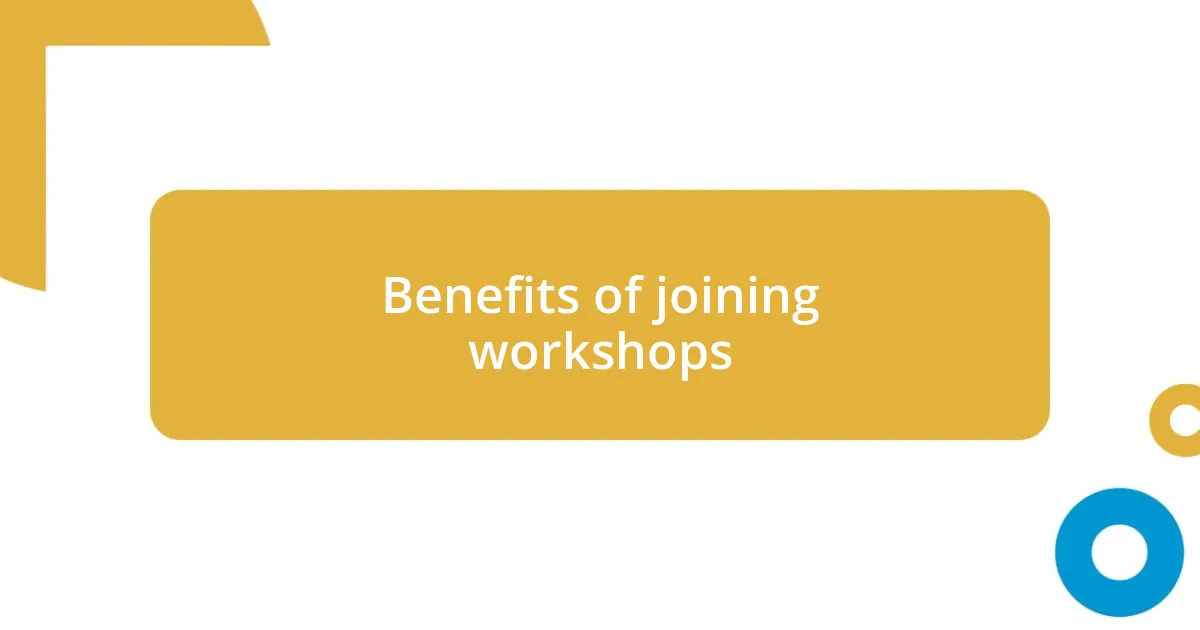
Benefits of joining workshops
Joining poetry workshops offers an abundance of benefits, both creatively and personally. One of the most profound advantages I’ve encountered is the opportunity for constructive feedback. I still remember the moment a fellow participant told me my metaphor about the ocean was powerful but needed clarity. That simple insight transformed my poem. It opened my eyes to how community feedback can sharpen one’s writing, pushing limits and inspiring deeper exploration of themes.
Here are some key benefits I’ve taken away from participating in poetry workshops:
- Enhanced Writing Skills: Regular practice and critique help refine techniques and develop a unique voice.
- Inspiration from Peers: Exposure to diverse styles sparks new ideas and encourages experimentation.
- Supportive Environment: A sense of belonging fosters confidence and willingness to experiment with different forms.
- Emotional Connection: Sharing work creates bonds, highlighting the universal nature of experiences.
- Goal Setting: Workshops often encourage setting and achieving personal writing goals, fueling motivation.
Through these experiences, I’ve learned that each workshop is a stepping stone in my writing journey, leaving an indelible mark on my poetic evolution.
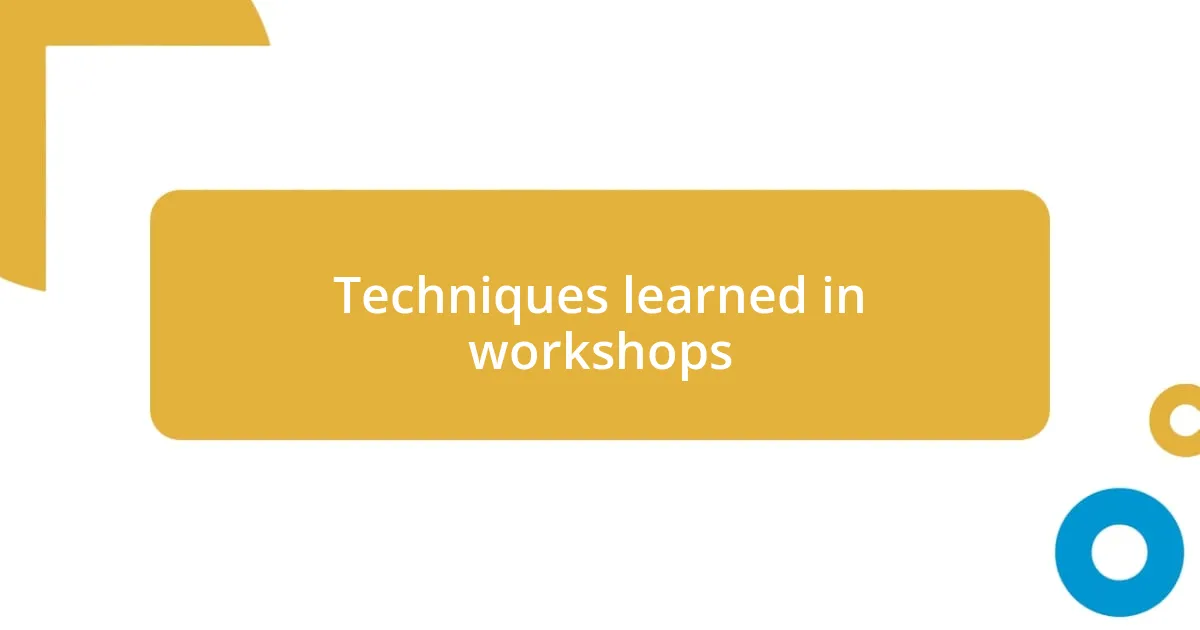
Techniques learned in workshops
Participating in poetry workshops introduced me to various techniques that have fundamentally shifted my writing style. One standout moment was a session focused on imagery. I learned that a single vivid image can evoke emotions more powerfully than an entire paragraph of description. When a fellow poet shared her piece about a winter landscape, it was as if we could feel the chill in the air, and it reminded me of the importance of sensory details in making poetry resonate.
Another technique I found invaluable was the concept of writing prompts. These prompts acted as creative catalysts, pushing me to explore themes and styles I might have otherwise avoided. I remember an exercise where we had to write a poem from the perspective of an inanimate object. At first, I hesitated, thinking, “What could a broken clock possibly say?” Yet, the experience opened a whole new creative avenue for me, allowing my imagination to flourish and boosting my confidence in taking risks with my work.
Lastly, the process of peer reviews taught me the art of constructive criticism. Early on, I was nervous about sharing my work. But when a group member noted a phrase that had “sparked joy,” it shifted my mindset entirely. I learned how to give feedback that was not only honest but also encouraging, cultivating a supportive community where everyone felt inspired to improve. That balance of critique and affirmation is vital in a workshop setting, reminding us we all have a unique voice worth sharing.
| Technique | Description |
|---|---|
| Imagery | Focused on creating vivid mental pictures to evoke emotions. |
| Writing Prompts | Used as creative sparks to encourage exploring new themes and styles. |
| Peer Reviews | Emphasizes the importance of constructive feedback for growth. |
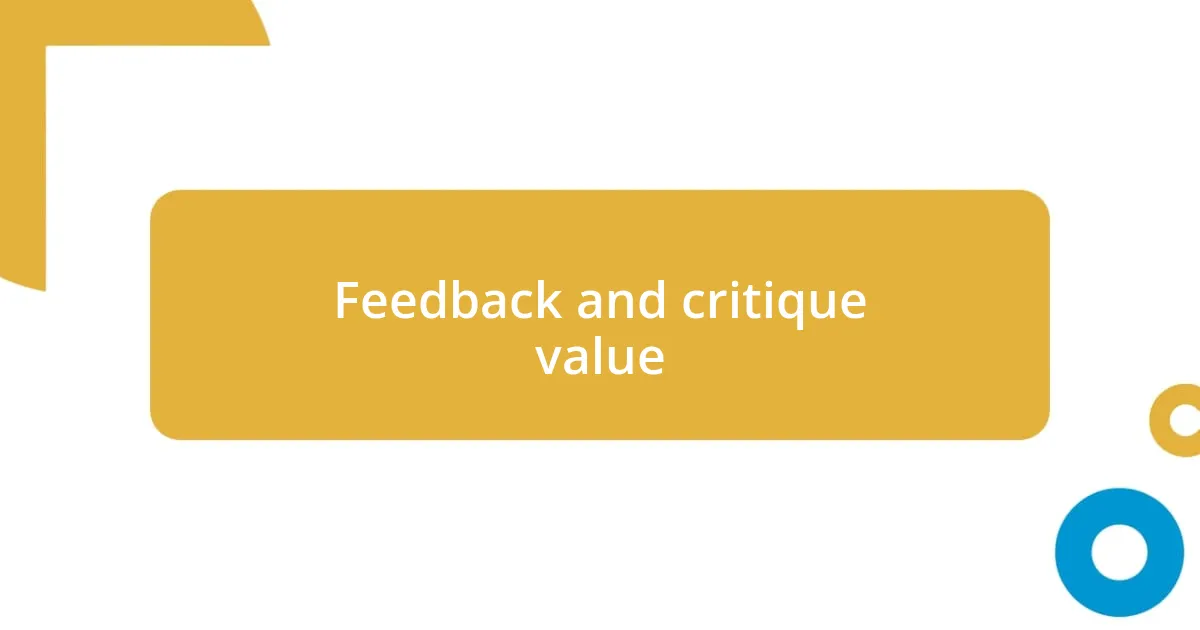
Feedback and critique value
Receiving feedback in poetry workshops has been a transformative experience for me. I recall one instance where I shared a piece that I thought was polished, yet a seasoned poet pointed out a repetitive theme that had gone unnoticed by me. That moment taught me that sometimes, we are too close to our work to see what’s truly there. It’s a humbling reminder of how others’ perspectives can shine a light on areas for growth that we may overlook ourselves.
Critique isn’t always easy to swallow, but I’ve learned to embrace it as a gift. When I first received critical feedback, my initial reaction was often defensive. But over time, I came to appreciate feedback as a necessary part of the creative process. For instance, a comment on the rhythm of one of my poems led to a complete overhaul that made it sing. Isn’t it intriguing how one suggestion can unlock a new level of depth in our writing?
Moreover, I’ve found that giving feedback teaches me just as much as receiving it. When I sit down to provide a thoughtful critique, I analyze not only others’ choices but reflect on my own writing practices as well. It’s like a mirror reflecting my growth journey. This reciprocal nature of sharing and critique creates a community where everyone learns—where we cultivate a shared passion for poetry that ultimately pushes us all to new heights. Don’t you find it fascinating how connection can elevate our individual voices in such powerful ways?
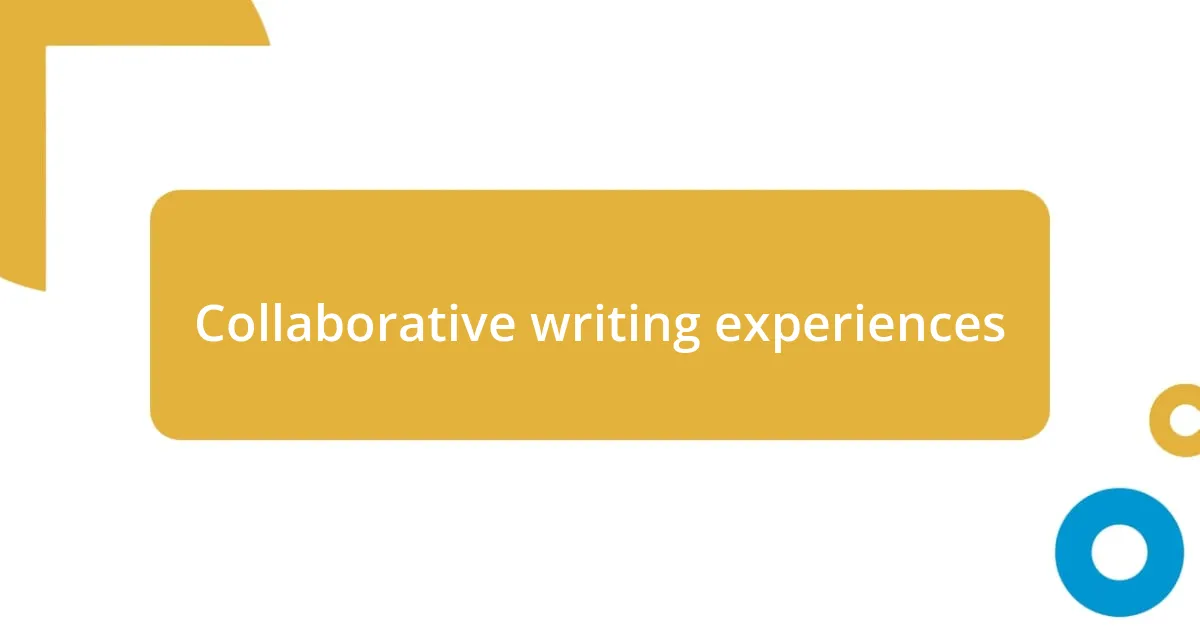
Collaborative writing experiences
Exploring collaborative writing in poetry workshops has been a revelation for me. I remember one session where we collectively created a poem, each contributing a line. As we passed the paper around, I felt a surge of excitement each time I read what others had penned. Their words challenged me, made me rethink my own approach, and ultimately shaped our final piece into something unexpected and beautiful. Isn’t it inspiring how shared creativity can lead to outcomes we might never achieve alone?
Working alongside fellow writers also taught me the value of diverse perspectives. In one workshop, we played a game where we had to write about the same theme but from different emotional standpoints. I chose to explore joy, while another writer tackled loss. The contrast highlighted the intricate layers of human experience, reminding me that poetry can resonate on multiple levels. This collaborative process not only enriched my own writing but deepened my understanding of how interconnected our emotions can be. Isn’t it fascinating how collaboration can bridge different feelings into a unified tapestry?
One of the most memorable experiences was a group exercise where we wrote back-and-forth responses to each other’s lines. This back-and-forth not only sparked my creativity but also forged connections among us. I could sense waves of inspiration flowing with each response, and it felt like a dance of ideas. I’ll never forget how one line sparked an entirely new narrative for me, pulling in threads of vulnerability I hadn’t dared to weave before. Have you ever wondered how sharing our thoughts can not only transform our work but also strengthen our bonds with others? That’s the magic of collaborative writing.
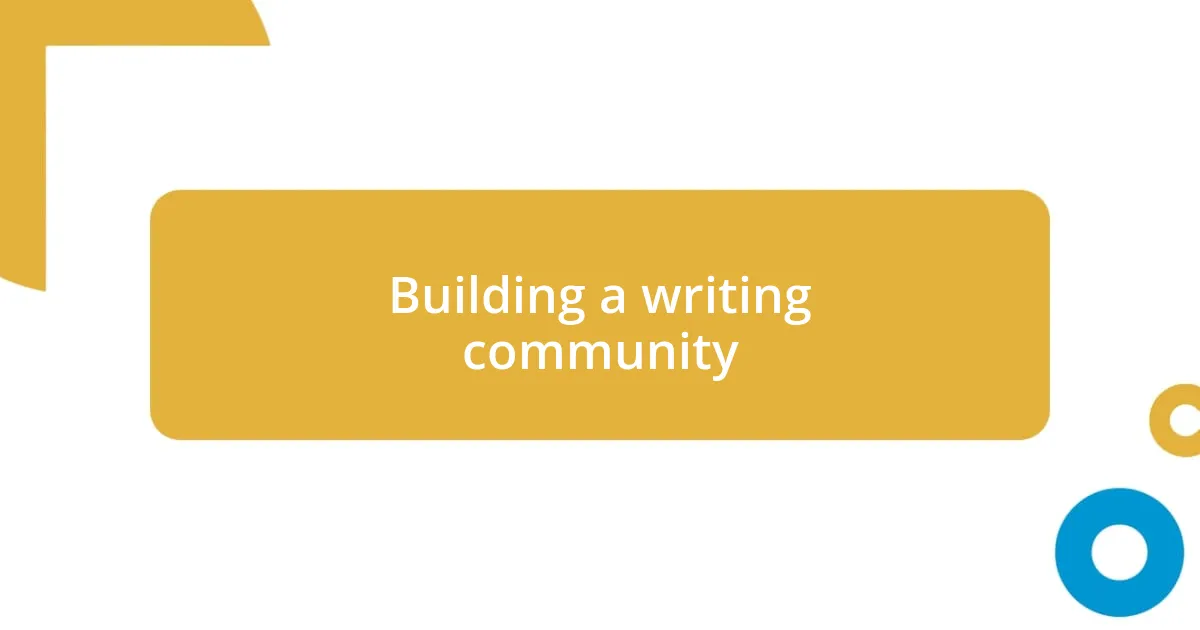
Building a writing community
Building a writing community has been one of the most enriching aspects of my poetry workshops. I recall a moment during a session when we all gathered in a cozy circle, sharing not just our words but our stories. The warmth of that space enveloped us, creating an unspoken bond. It was in that circle that I realized the power of vulnerability; our willingness to expose our truths drew us closer together, making each critique feel less like a judgment and more like an opportunity for growth. Don’t you think it’s amazing how shared moments of honesty can become the foundation for a supportive community?
One experience that stands out was the time we hosted an open mic night, where workshop members showcased their work. I had butterflies in my stomach, but the encouragement from my peers was palpable. As I listened to each person pour their heart out, I felt the air crackle with creativity and empathy. It reinforced my belief that poetry has the unique ability to connect us on a deeper level. Isn’t it profound how creating a space for our voices to be heard can ignite a collective passion for the written word?
Lastly, I’ve come to appreciate the friendships that blossom within this community. Regular meet-ups became a source of sustained motivation for me. I often found myself texting a fellow poet late at night to share an idea that had struck me, and they’d respond with enthusiasm and support. It’s this mutual encouragement that keeps our pens moving. Have you thought about how writing becomes a shared journey, where every success and setback is felt collectively? That camaraderie enriches not only my craft but my entire experience as a writer.
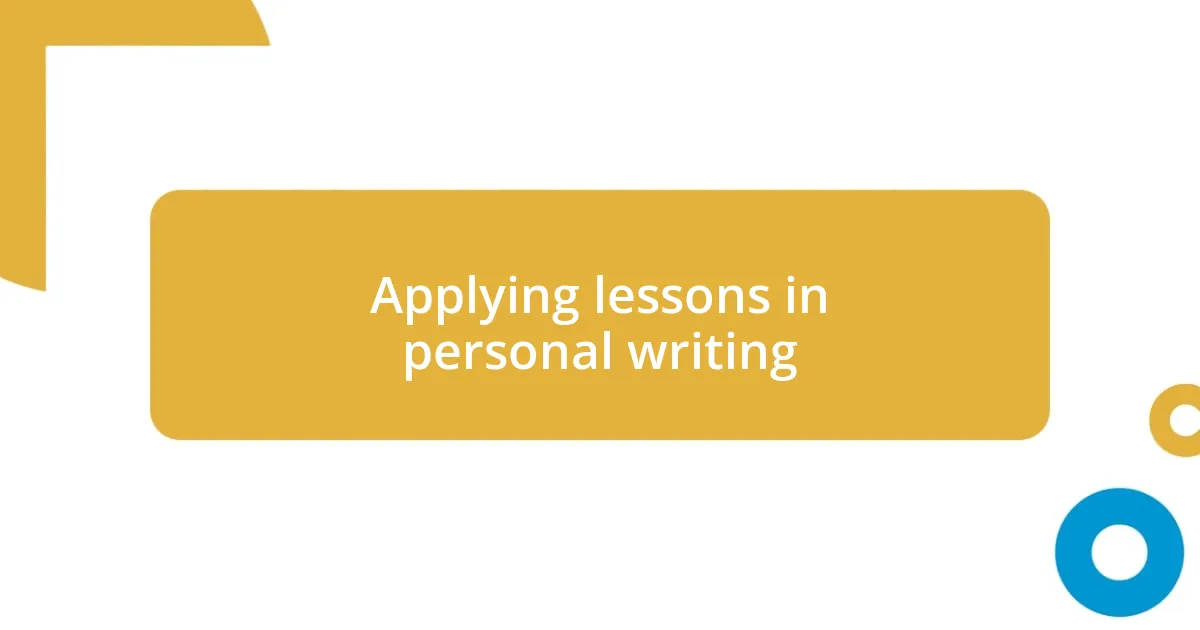
Applying lessons in personal writing
Every poem I craft reflects lessons from those transformative workshops. I remember a quiet moment when I experimented with imagery, focusing on the senses. I described a sunset as “an orange embrace fading into twilight.” This approach taught me that vivid imagery isn’t just a tool; it’s a way to transport the reader into the poem’s world. Have you felt how the smallest details breathe life into writing?
One of the most significant lessons was the importance of vulnerability. During a workshop, I shared a piece about personal loss that felt incredibly raw. The room fell silent, not out of discomfort, but in shared understanding. That experience taught me that vulnerability can forge unexpected connections with my audience. Don’t you think that when we open our hearts, it invites others to do the same?
As I continue to write, I often reflect on the feedback I received from peers. One suggestion from a workshop buddy inspired me to explore my writing voice more freely. I now allow myself to break the rules on occasion, using unconventional structures and playful language. This freedom has transformed my work into a reflection of my true self. What if embracing imperfection in our writing leads to the most genuine expression?












